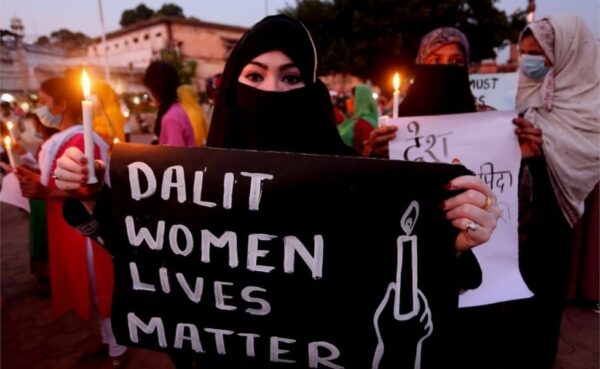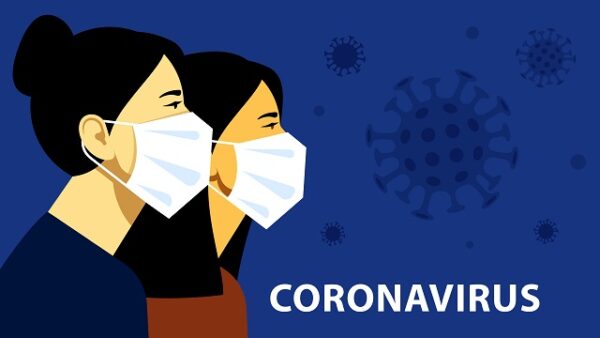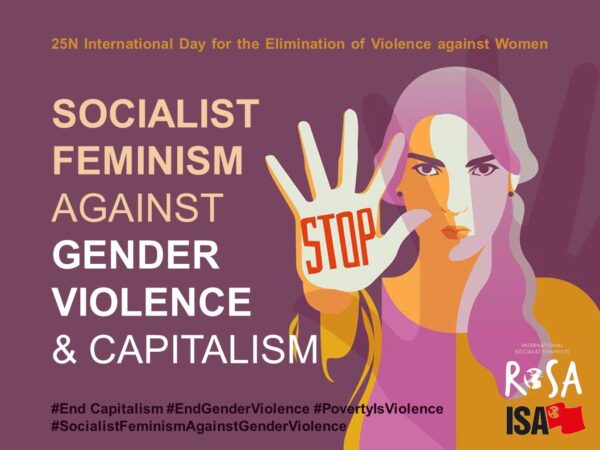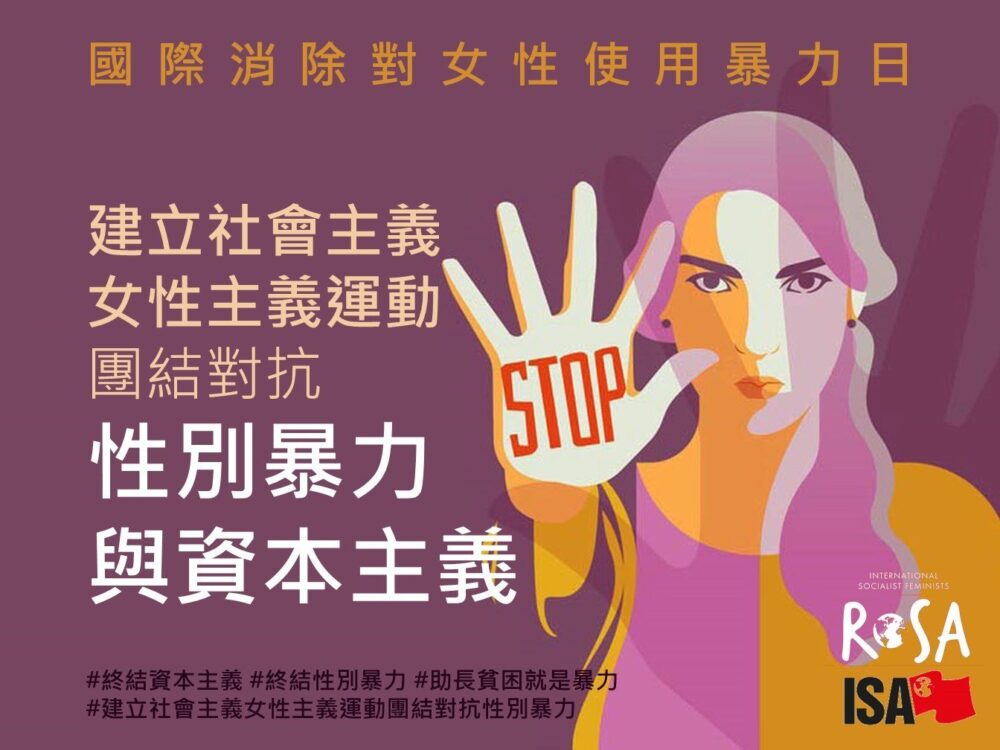The fight for an end to violence against women must be an anti-capitalist fight.
Statement by the ISA’s International Women’s Bureau
November 25th is the International Day for the Elimination of Violence against Women, founded in 1981 after the murder of the Mirabal sisters by the military dictatorship of Trujillo in the Dominican Republic. For us socialist feminists, the fight for an end to violence against women must be an anti-capitalist fight. Violence is only possible because it is nourished by a model of society that legitimises an idea/image of women as being inferior, more fragile and in the end, less humane.
This does not surprise us, since capitalism needs to keep up the “traditional” family and role models for exploiting the paid and especially also the unpaid work of women; and since capitalism needs to create divisions and rank humans in order, by identifying them as more vulnerable, to justify every form of violence in the name of sustaining this system.

On the eve of 25N, we can see attacks on women as well as collective struggle against them in India, Turkey, Poland, Ireland and other countries. Protests have taken place across India, sparked by the gang rape and brutal murder of a young Dalit woman in Uttar Pradesh. In Poland, on 24th October, after a series of consecutive protests, women organised a strike against abortion restriction, which in practice would prevent 98% of legal abortions, violating the already restricted rights of women to decide over their bodies. This movement has seen the largest protests in Poland for decades, led by young women, mobilising and inspiring the working class of all genders.
In Ireland, the scandal of single mothers having their children taken off them by the church was recently uncovered; only 30 years ago (in the 1980s), hundreds of babies were taken. The report proving this crime was presented in October. It only shows how urgent it is to organise for an end to violence against women across the world!
Capitalism is a system of crisis
This has become clearer than ever this year as capitalism has responded to the pandemic by collapsing, letting workers and the poor pay the biggest price and trying to throw back women’s rights by many years, perhaps decades. This threat of a huge regression in women’s rights is even acknowledged by the same pro-capitalist institutions that have been telling us for so long that women could achieve incremental change by working their way through the system. This, alone, provides a damning indictment of capitalism.
In the second quarter of 2020, the world economy fell by 10 percent and world trade by 27 percent. The number of lost paid working hours globally corresponds to 500 million full-time jobs. At the same time the number of unpaid hours worked by mainly women rose with homeschooling and the overstretched health system. Women’s jobs have been most particularly vulnerable, as the sectors most heavily affected by the Covid crisis have a high proportion of female workers (retail, hospitality etc). In the neo-colonial world, the situation is even more dire, as a majority of women work in the informal economy with no legal social nor health protection, and the combination of the crisis and the pandemic have made their situation far more precarious on every level, including by exposing them to further violence and abuse.
Due to the politicians’ way of dealing with the corona crisis, the number of hungry people in the world is doubling this year. Already several years ago, the number of hungry people in the world began to increase again and will soon reach one billion people. The number of refugees is also increasing and is now higher than ever. Again it will be women hardest hit as they are responsible to find food — and water — in the neocolonial world and are the most vulnerable refugees, victims to human trafficking.
Only the struggle for a socialist society can give us the conditions to overcome this perverse logic and build new social relations, capable of eliminating violence against women. Let’s fight for this together!
The pandemic and the uncovering of violence
The pandemic reinforces the case that women are at the forefront of resistance. Official data show that women make up more than two thirds of health workers worldwide. In many countries, nursing and care work is undertaken by majority black and other vulnerable women, like migrants and indigenous people, often the breadwinners of the family.
It is well documented that domestic violence increases during crises. Under lockdown, women and other victims of abuse are forced into closer contact with abusers who can more easily monitor their behavior and prevent attempts to seek support. The lack of affordable housing and social work existing already before the pandemic have even more deadly effects. Women feel the effect of the pandemic at work, at home, and in a violent way its consequences.
It is interesting, if not tragic, that the World Bank, in October 2020, alerted the world to violence against women. Paradoxically, they are a constituent part of those who produce more austerity, cuts in health, education, and those responsible for the worldwide lack of control of a pandemic, precisely because of the centrality of the market and the business interests.

We can have no illusion that oppression against women can be solved by the hand of those who allow and perpetuate the violence against women on a daily basis. With the pandemic, capitalism became naked.
The increase in cases of violence, aggression, and the growth in cases of mental illness of women, especially working women — is proof that this social system cannot provide a safe and secure life for the majority. We know that also liberal, pro-capitalist feminism takes up the issue of violence against women. While we welcome that the issue is recognised more widely we also understand that those same liberal, pro-capitalist forces are responsible for the politics that create and increase the same violence. So they are not our allies in the struggle against this problem but part of the problem themselves.
The numbers are frightening
United Nations (UN) data shows that 17.8% of women worldwide suffered physical or sexual violence in 2019: 1 in 5 women was subjected to violence by a partner, former partner or someone in their family only last year. Violence is understood as all kinds of aggression, whether physical, psychological, sexual, emotional.
With the isolation, added to the lack of jobs, equipment and public services cases of violence have exploded. Quarantine forced many women to live with their aggressors daily. In Brazil, more than 76% of the perpetrators are known to the victim, such as family members. The increase of violence in confinement is not only a problem in Brazil. The number of calls to domestic violence helplines have sky-rocketed globally during lockdowns. Examples include an increase of 161% in Italy; 30% in Argentina; 40% in Brazil; 65% in the UK; 500% in Tunisia.
This isn’t just an increase in calls but actual violence. In Morocco, the Ennakhil Listening Center reported that economic violence has increased 60% and psychological violence 55%. The Organisation for Women’s Freedom in Iraq (OWFI) reports a doubling of applications for admission since the blockade, especially of young women. In the occupied Palestinian territories, the Women’s Centre for Legal Assistance and Counselling reports a 75% increase in social and legal consultations, mainly in urban, rural areas and refugee camps. Emotional, psychological and economic violence, as a direct result of food shortages and unemployment, is increasing. In Honduras, there has been an increase in femicide, and the militarization of daily life has meant the imposition of increased repression by police authorities, especially of women and girls who leave home to collect firewood and water for their families.
Violence on the rise in every country
During the first lock down in Ireland, from April-May 2020, reports of domestic violence increased by 30%. This was highlighted by a number of extremely violent, horrific murders. Especially women in their 30s and 40s and elderly women were affected. Services dealing with gender violence have historically been ignored and underfunded — in the 2020 budget funding for greyhound racing was as big as funding for all services fighting against domestic violence combined! This has created a huge crisis for women — there is simply no capacity to support women escape from an abusive relationship. As there is now a second lockdown, this situation is expected to further deteriorate.
In the United States, reports of domestic violence have skyrocketed and abortion rights are being rolled back, all while women are more likely to both be essential workers, and face layoffs. This is in addition to women taking on the bulk of increased domestic work and childcare as kids stay home from school.
In Sweden in April there was an increase in applicants to girls’ and youth shelters of between twenty and forty percent. In the spring, there was no more partnership violence reported to the police than the year before, but it seems that there is a faster increase in the crime of abuse of women this autumn.
In Brazil, the situation of violence against women has increased exponentially. There are records of a department store that saw an increase of 450% in one year up to May of reports of cases of violence through its online app system. The numbers of femicide grew by 22% already at the beginning of the pandemic in April.
In the UK, in ‘normal times’ two women a week are killed by a current or former partner. During the first seven weeks of the national lockdown, 26 women and girls were killed by a member of their family. The government’s National Oversight Group on Domestic Abuse has not met once since the start of the pandemic, showing that the massive increase in domestic violence is not taken seriously. Instead, they asked postal workers and delivery drivers to ‘check for signs’ of abuse and deemed the workers who are supposed to be doing this as non-essential!
In many countries with an overstretched health system, abortion was not rated as “essential” medical treatment with women being de facto forced into the “choice” between an unsafe, expensive DIY abortion or having an unwanted child. In addition to the attack on abortion rights in a number of countries this is another level of state violence against women.
Neo-colonial capitalism and abuse by imperialist institutions: more violence against the most vulnerable
On 29th September a report was released detailing the sexual abuse by WHO (World Health Organisation) workers during its response to the 2018 Ebola crisis in the Democratic Republic of Congo (DRC). Along with the WHO, other agencies and NGOs such as ALIMA, UNICEF, IMC, World Vision, OXFAM, Doctors Without Borders stand accused. Many local women were forced to have sex in exchange for work and food.
The vulnerability of women, aggravated by pandemics, is eventually used as a bargaining chip for those in power: whether men, institutions, or countries, who end up securing their interests by exploiting situations of abuse and violence.
This scandal shows that these types of agencies, in connection with imperialist interests, in neo-colonial countries, reveals the farce of the so-called social aid to victims, showing their roles as strengthening relations of colonialism, control and power. These elements only reinforce the violence against women’s bodies.
We must reject the false solutions presented by organizations of this type, which, beyond making diagnoses of the problems, are incapable of guaranteeing security and better living conditions for working class women and instead struggle to cancel the debts of those countries, to stop the imperialist exploitation and the pressure to reduce, for example, state subsidies on food to name just some of the central demands.
Nationalism and reactionary attacks: the new face of the violence against women
All over the world, nationalism is on the rise, as a result of the global situation and the US/China trade war. Right-wing populist leaders and hateful politicians such as Trump, Bolsonaro, Erdogan, Putin, Xi Jingping and others promote sexist views. Together with serious restrictions or threats against the right to abortion (USA, Poland, Slovakia, etc.), the notion is put forward that it shouldn’t be the woman herself who decides over her body. Women are made less worthy. This idea will then also lead to an increase in violence against women as her position in society is weakened and violent men are given the green light.
These extreme right-wing governments have organised a war against our rights. Thirty-two countries have built a league against abortion rights. Among them, USA, Brazil, Egypt, Indonesia, Pakistan, Poland and Hungary. This is a clear response to the wave of women’s struggle in the world, and proof that the violence of the capitalist state remains a strategy of domination and control of this system. We need to follow the example of the Polish working class and respond with even more struggle.
Collective struggles and organisation as a way out
The pandemic is not over yet! And the numbers of infected people, as well as of violence against women, continue to grow in part of the neo-colonial countries, especially in Latin America and India.
Between 2016 and 2020, we witnessed massive struggles on the streets led by women, mostly young, against the sexism that affects us in various ways. This energy of struggle and resistance has not disappeared.
The pandemic has aggravated a concrete situation that was already very difficult, and has already taken thousands of women to the streets.

This resistance will need to be taken up again in the defence of the lives of thousands of women, especially working class women, who are affected by this wave of barbarity and violence.
On August 23rd, a half an hour Symbolic feminist strike took place in Israel against a brutal gang rape of a 16 year old girl. Demonstrations took place from August 20th to 23rd and lasted until late into the night. Several roads were blocked as demonstrators participated in a spontaneous march in Tel Aviv, as well as in Haifa. Young people and women were the most active in these initiatives: for many, it was the first time they had been in the struggle.
When #metoo spread around the world, it had a major impact on the discussion about sexual abuse in many countries, even where there haven’t been movements against sexism. For example, in Denmark it was very limited until the beginning of the year when the American film producer Harvey Weinstein was sentenced to prison, which started the mass discussion about consent, abuse and women’s rights. Since the beginning of October, a #metoo movement has begun to spread throughout the country. In both the film industry, politics and several other areas, women come forward and tell about abuses they have been subjected to. Thousands of Danes have signed a number of different petitions drawing attention to sexism in workplaces in several different industries.
We have also seen the outbreak of strikes by health workers, particularly women, fighting for safe working conditions and pay rises in many parts of the world. In Nigeria, hundreds of thousands have taken to the streets to fight against police brutality. In all these actions women have been on the front line of the demonstrations.
Socialist programme for an end to violence
The official UN campaign on the 25th November’s global theme is “Orange the World: Fund, Respond, Prevent, Collect!”. They ask for people to wear orange and to put orange posters in their windows. They call for funding for women’s services to be included in government Covid stimulus packages, a response to the rising violence with maintaining essential services, a campaign on attitudes to prevent violence and to collect data on how bad it is! To say that this doesn’t go far enough would be an understatement.
We cannot rely on capitalist governments or even NGOs and liberal campaigning groups. To win the sort of services and support which are necessary to save women’s lives in this crisis, it will require a mass movement of working class and poor people of all genders.
From the perspective of socialist feminism, ISA calls on all women to organize a network of international struggles and actions around policies and immediate actions that ensure the defence of our lives.
However, we are not just fighting for a return to the ‘old normal’ because that was also unbearable. We need to go beyond demands which only focus on the immediate situation and fight for a new future for the masses internationally.
The organization of these struggles needs to take place jointly, collectively and internationally. Despite the differences in levels of organization and response of capitalism in each country, it is undeniable that it is the same system that violates us. Women workers and young people from all over the world must build a powerful anti-capitalist struggle, as the only possibility of achieving an end to oppression. We see it as our role to propose to all women that get active against violence a programme that goes further than appeals to the rulers: we propose a programme that goes directly to the heart of the problem — the capitalist system. Historical experiences from the past have been able to prove to us that no capitalist country has conquered advances such as those which were achieved by the Russian Revolution of 1917, with regard to the demands of working class women.
In moments of intense crisis, like this one, socialists understand that we must combine immediate measures with struggles and demands that will enable us to build a movement that can in fact break with this oppressive and exploitative system which is not capable of providing a decent life and defending ours!
On this 25N we call for the construction of a socialist feminist movement and the struggle for an International Socialist Alternative, as a way of fighting for an end to violence against women!
Ni Una Menos —Not One Less — no more lives must be lost due to gender violence; no more mental health or physical health damaged. We fight to end gender violence, abuse and harassment in all its forms and everywhere it takes place: the workplace, the home, schools and universities, state institutions, on the street and online.
Politicians are saving banks and companies but women’s lives are sacrificed. This pandemic of violence requires emergency measures. We need an immediate increase in public spending and the development of government policies to fight violence against women. This should include the construction of shelters and networks for women and children in situations of violence and specialised domestic violence and sexual violence services available locally to everyone who needs them. Mental health services should include local access to the counselling and therapy required by victims, as well as specialised psychological assessments and treatment for perpetrators. There should be a living wage and a guaranteed job for everyone to make an independent life possible.
Coronavirus has highlighted the fundamental need to put welfare of everyone as the first priority. We need to seize the wealth of the capitalist elite to fund a massive expansion of public services; from free healthcare to free childcare. There is no reason at all for mass unemployment when there is so much that needs to be done. With shortened working days without a reduction in wages, with increased welfare and the creation of green and socially useful jobs, unemployment can be reduced to zero.
No one should go hungry. For an emergency plan to fight the increase of hunger — under the control of local societies, workers organisations, poor and small farmers — as a first step to a replanning of agriculture. End the harmful capitalist methods of production that create disease and hunger and build a common owned agriculture in harmony with nature.
Workers must have safe workplaces against the spread of infection, sexual harassment and stress. It requires secure employment, workers’ control over health and safety issues and an increase in staff to reduce work stress.
Real rent controls and the building of public housing en masse — everyone has the right to a safe, affordable and peaceful home. Expropriation and public ownership of homes kept empty due to speculation.
For free, quality, public, secular education with progressive, age-appropriate, LGBTQ inclusive, sex and relationship education that has a focus on consent.
Free and easy access to contraception and abortion.
The trade unions and shop stewards must lead a real struggle to unionise, to fight for an end to precarious work, for a living wage for all workers, and against sexual harassment in the workplace — such a movement could take the lead in fighting all forms of sexism, misogyny, racism, homophobia and transphobia to build a united working class struggle.
End the courts reproducing sexism, discrimination and victim blaming. Every part of the state and welfare service that comes in contact with victims and perpetrators should be educated about the issue of gender violence and trained to ensure that complainants and victims are treated with respect.
We fight for a state that is democratically governed by the working class from below, removing the current bias in favour of the ruling classes as well as eliminating the presence of racism, sexism and discrimination in the state and judicial systems once and for all.
For an immediate and mass response from the entire working class to states and religions’ attempts to deprive women and LGBTQ people of their right to their bodies, such as the attacks on abortion rights in many countries.
Struggle against the objectification of the bodies of women and an end to sexist advertisements — the media needs to be taken under democratic control.
End war and fight for climate justice — end racist immigration policies — for the democratic right to asylum.
Democratic public ownership and working class control of the key levers of the economy, of the main wealth and resources, as part of a democratic socialist plan of the economy to provide for the needs of people and planet, not profit.
We fight for bread and we fight for roses too — for a socialist society whereby the sexism and violence against women is truly a thing of the past — for a socialist world free from class division, oppression, war and violence in which every person has the right to a good quality standard of living, and has the freedom to enjoy life!




